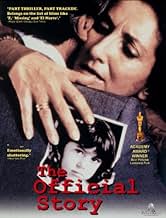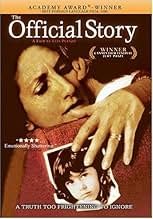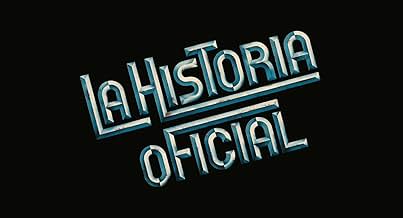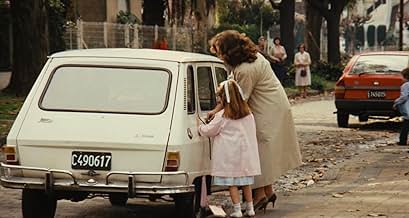NOTE IMDb
7,7/10
11 k
MA NOTE
Pendant les derniers mois de la dictature militaire argentine en 1983, un professeur de lycée cherche à savoir qui est la mère de sa fille adoptive.Pendant les derniers mois de la dictature militaire argentine en 1983, un professeur de lycée cherche à savoir qui est la mère de sa fille adoptive.Pendant les derniers mois de la dictature militaire argentine en 1983, un professeur de lycée cherche à savoir qui est la mère de sa fille adoptive.
- Réalisation
- Scénario
- Casting principal
- Récompensé par 1 Oscar
- 25 victoires et 9 nominations au total
Avis à la une
This Piece was powerful and thought provoking. It was also perhaps the most depressing film I have ever seen in my life. The tragic story leaves the viewer with a somewhat empty feeling, which is appropriate. The sad fact is that thousands of families in Argentina fell the emptiness that this film induces every single day of their lives. Hector Alterio spectacularly portrays the jaded and evil Roberto, who works with the corrupt ruling military junta. One truly grasps a sense of the insecurities and weakness behind such bullies.
This movie is a wakeup call for anyone who believes that apathy is okay. The truth is that the tragedies in Argentina in the 1970's were partly allowed to occur because of the ignorance and apathy of both people within Argentina and in the outside world. Hopefully, by watching this film, people will resolve to prevent such a tragedy from ever happening again.
La Hitoria Oficial is a spectacular film to learn about a subject which receives little or no attention in the US. However, be warned: it is one of the most tragic films you may ever see in your life. You will leave the film both saddened and angered that nothing was done to prevent these horrible crimes.
This movie is a wakeup call for anyone who believes that apathy is okay. The truth is that the tragedies in Argentina in the 1970's were partly allowed to occur because of the ignorance and apathy of both people within Argentina and in the outside world. Hopefully, by watching this film, people will resolve to prevent such a tragedy from ever happening again.
La Hitoria Oficial is a spectacular film to learn about a subject which receives little or no attention in the US. However, be warned: it is one of the most tragic films you may ever see in your life. You will leave the film both saddened and angered that nothing was done to prevent these horrible crimes.
Adoption can be a harrowing business at the best of times, and the final scene of 'La Historia Oficial' probably represents The End of the Beginning rather than The Beginning of the End. The real drama almost certainly still lies ahead when sweet little moppet Ana discovers the reality about her parents; as teenaged Ann Blyth traumatically did thirty-five years earlier in the Goldwyn production 'Our Very Own' (1950).
La Historia Official is a well-made film about awakening from passive complicity in evil, in this case, forced adoption. The Grandmothers of the Plaza de Mayo were and are an inspiration to those who struggle to uncover and resist abuses in adoption practices, be they the enslaved Irish women of the Magdalen laundries or the many indigenous peoples who had children forcibly removed from homes to be adopted by whites. Most of adoption does not involve abduction, but to turn a blind eye to the fact that it does exist, is to be passively complicit, as was the protagonist in this film.
The scene in which the teacher realizes that tremendous evil has indeed been perpetrated, and that she may very well be the beneficiary of such evil, is staggering. Norma Aleandro is a talented enough actress that we believe her initial rejection of this revelation, and her gradual evolution from passive cohort to courageous seeker of the truth.
The scene in which the teacher realizes that tremendous evil has indeed been perpetrated, and that she may very well be the beneficiary of such evil, is staggering. Norma Aleandro is a talented enough actress that we believe her initial rejection of this revelation, and her gradual evolution from passive cohort to courageous seeker of the truth.
La Historia Oficial is an excellent movie. It is also the testimony of the suffering of the Argentinian people during the military dictatorship. But those who are not from Argentina, like myself, can very well be touched by this movie. I was observing the cruelty of the government and thought "my God, totalitarism is always the same, and no matter if the violation of human rights occurs in Argentina under the military regime, in Cuba under the Castro dictatorship, in Chile under Pinochet, in Europe during Hitler, people suffer the same and the least we can do is to feel compassion". A good lesson from this movie, generation after generation we shouldn't forget the victims. They deserve justice.
In the powerful 1985 film The Official Story, Director Luis Puenzo tells the story of a teacher's awakening to conscience at the end of Argentina's "Dirty War" of the late 70s and early 80s. As in Pinochet's Chile, the military secret police sought to consolidate their power by routinely torturing and murdering students, political activists, opponents of the regime, and even expectant mothers. Many ended up as desaparecidos, people taken by the government and not returned. The film is about one mother's search for the truth about her adopted daughter and her discovery brings harsh political reality very close to home.
In The Official Story, Alicia (Norma Aleandro) lives a comfortable middle class life. She teaches History to high school students and enjoys a family that includes her well-to-do husband Roberto (Hector Alterio) and 5-year old adopted daughter Gaby (Analia Castro). Not used to asking questions, she believes whatever she has read in history books and is confused when one of her students tells her that "history is written by assassins." She sees the demonstrations of the "Mothers of Plaza de Mayo", a group seeking information about missing family members but remains uninvolved. When her friend Ana (Chunchuna Villafane) visits after living in exile for many years, however, she learns, in an intensely emotional scene, that Ana had been imprisoned and tortured by the police trying to locate her husband, a suspected "subversive".
Ana tells Alicia that many others had "disappeared" and that babies had been taken from their mothers and given to childless friends of the junta. Alicia begins to wonder if her own child was the daughter of a political victim and questions her husband but when he is evasive, she suspects that he may be hiding a dark secret. Although fearful at the prospect of losing Gaby, Alicia is determined to find out about her daughter's past and begins to search hospital records and government archives. Ultimately, she must confront her own responsibility in a climax of shattering force that underscores the tragedy of political ideologues who would rather destroy family solidarity than risk losing power.
In The Official Story, Alicia (Norma Aleandro) lives a comfortable middle class life. She teaches History to high school students and enjoys a family that includes her well-to-do husband Roberto (Hector Alterio) and 5-year old adopted daughter Gaby (Analia Castro). Not used to asking questions, she believes whatever she has read in history books and is confused when one of her students tells her that "history is written by assassins." She sees the demonstrations of the "Mothers of Plaza de Mayo", a group seeking information about missing family members but remains uninvolved. When her friend Ana (Chunchuna Villafane) visits after living in exile for many years, however, she learns, in an intensely emotional scene, that Ana had been imprisoned and tortured by the police trying to locate her husband, a suspected "subversive".
Ana tells Alicia that many others had "disappeared" and that babies had been taken from their mothers and given to childless friends of the junta. Alicia begins to wonder if her own child was the daughter of a political victim and questions her husband but when he is evasive, she suspects that he may be hiding a dark secret. Although fearful at the prospect of losing Gaby, Alicia is determined to find out about her daughter's past and begins to search hospital records and government archives. Ultimately, she must confront her own responsibility in a climax of shattering force that underscores the tragedy of political ideologues who would rather destroy family solidarity than risk losing power.
Le saviez-vous
- AnecdotesThe filming began in 1983, the same year that the military dictatorship ended in Argentina. The filming was cancelled due to the threats received by the director, actors and particularly to Analia Castro's family. It was announced that filming was cancelled, but production continued in secret until 1985.
- Versions alternativesThe 2015 restoration is extended by 2 minutes due to the inclusion of restoration credits at the beginning and end of the film. The opening restoration credits play over the opening scenes in Alicia's classroom. During the restoration end credits, the background goes black and the instrumental version of 'El país de nomeacuerdo' is looped.
Meilleurs choix
Connectez-vous pour évaluer et suivre la liste de favoris afin de recevoir des recommandations personnalisées
- How long is The Official Story?Alimenté par Alexa
Détails
Box-office
- Montant brut aux États-Unis et au Canada
- 29 426 $US
- Week-end de sortie aux États-Unis et au Canada
- 29 426 $US
- 10 nov. 1985
- Montant brut mondial
- 69 832 $US
Contribuer à cette page
Suggérer une modification ou ajouter du contenu manquant

Lacune principale
By what name was L'histoire officielle (1985) officially released in India in English?
Répondre






























